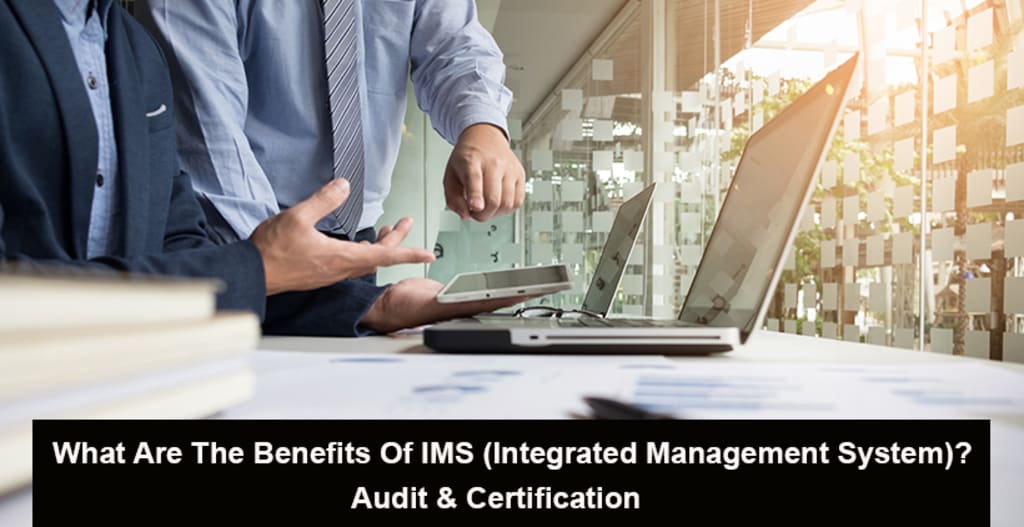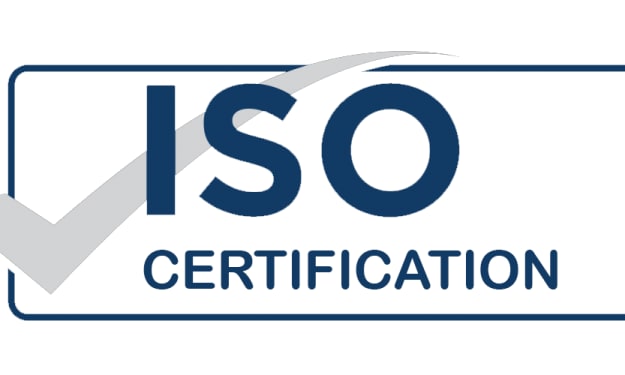What Are The Benefits Of IMS (Integrated Management System)? Audit & Certification
Benefits Of IMS (Integrated Management System)

An Integrated Management System (IMS) is a framework that combines multiple management systems, such as Quality Management System (QMS), Environmental Management System (EMS), and Occupational Health and Safety Management System (OHSMS), into one unified system.
The goal of an IMS is to provide a holistic approach to managing an organization's processes and operations. An IMS enables an organization to manage its processes and operations in an integrated and consistent way, by aligning its strategies, policies, procedures, and objectives across different management systems.
This can lead to improved efficiency, reduced costs, and increased customer satisfaction. Additionally, an IMS can also help organizations to meet the requirements of multiple standards and regulations, such as ISO 9001, ISO 14001, and OSHAS 18001, which provide a framework for the quality, environment, and health and safety management.
Benefits Of Integrated Management System
1. Improved efficiency: By integrating multiple management systems, an IMS streamlines processes and reduces duplication of effort, leading to improved efficiency.
2. Reduced costs: An IMS with the help of Integrated management consultants can help to reduce costs by identifying and eliminating inefficiencies, reducing duplication of effort, and minimizing the need for separate audits and certifications.
3. Increased customer satisfaction: An IMS can help organizations to understand better and meet customer requirements, leading to increased customer satisfaction.
4. Enhanced reputation: Organizations that implement an IMS can demonstrate their commitment to quality, environmental, and health and safety management, which can enhance their reputation.
5. Improved communication and coordination: An IMS can improve communication and coordination across different departments and management systems, leading to better decision-making and problem-solving.
6. Compliance with multiple standards and regulations: An IMS can help organizations to meet the requirements of multiple standards and regulations, such as ISO 9001, ISO 14001, and OSHAS 18001, in an integrated and consistent way.
7. Improved risk management: An Integrated Management Systems Consultant can help organizations to identify and manage risks across different management systems, leading to improved risk management.
8. Continuous improvement: An IMS provides a framework for continuous improvement, enabling organizations to review and improve their processes and operations constantly.
Role Of Integrated Management Systems Consultant IMS Implementation
The role of a consultant in the implementation of an Integrated Management System (IMS) is to provide guidance and support to the organization throughout the implementation process. A consultant can help organizations in the following ways:
1. Assessing the current state of the organization's management systems: A consultant can conduct an assessment of the organization's current management systems to identify gaps and areas for improvement.
2. Developing a plan for implementing the IMS: A consultant can help the organization to develop a plan for implementing the IMS, including setting objectives, identifying resources required, and establishing a timeline.
3. Training employees: A consultant can provide training to employees on the IMS, including its processes, procedures, and requirements.
4. Implementing the IMS: A consultant can assist the organization with implementing the IMS, including developing procedures and processes, and providing support during the implementation phase.
5. Auditing the IMS: A Integrated Management Systems Consultant can conduct internal audits of the IMS to ensure that it is being implemented effectively and identify areas for improvement.
6. Supporting certification: A consultant can assist the organization in preparing for and achieving certification to relevant standards, such as ISO 9001, ISO 14001, and OSHAS 18001
7. Continual improvement: A consultant can support the organization in maintaining the IMS and continuously improve it over time.
Overall, the consultant acts as an expert advisor, helping the organization to implement an IMS that meets its specific needs and ensures compliance with relevant standards and regulations.
Is Integrated Management System (IMS) Audit Vital Before Implementation?
An Integrated Management System (IMS) audit is a systematic and independent examination of an organization's IMS to evaluate its conformance to the requirements of the relevant standards and regulations, such as ISO 9001, ISO 14001, and OSHAS 18001.
The purpose of an IMS audit is to determine whether the organization's management systems are effectively implemented and maintained, and whether they are meeting the organization's objectives and the requirements of the relevant standards.
During an IMS audit, the auditor(s) review the organization's management systems, processes, procedures, and records to evaluate compliance with the requirements of the relevant standards. The auditor(s) will also conduct interviews with employees, review documentation and records, and observe operations to gather evidence of conformance.
The outcome of an IMS audit comes in a report that summarizes the findings of the audit, including any nonconformities or areas for improvement identified. The organization will then be required to address any nonconformities identified during the audit and implement corrective actions as necessary.
It's important to note that an IMS audit is not a one-time event, but rather it should be conducted on a regular basis to ensure that the IMS is being maintained and is effective in meeting the organization's objectives and the requirements of the relevant standards.
Integrated Management System In Australia
In Australia, an Integrated Management System (IMS) typically consists of the following elements:
Quality Management System (QMS):
A system that ensures that the organization's products and services meet the requirements of its customers and relevant regulations.
Environmental Management System (EMS)
A system that ensures that the organization's activities and products do not have a negative impact on the environment and that the organization complies with relevant environmental regulations.
Occupational Health and Safety Management System (OHSMS)
A system that ensures that the organization's activities do not pose a risk to the health and safety of its employees and that the organization complies with relevant health and safety regulations.
Food Safety Management System (FSMS)
A system that ensures that the organization's food products are safe for consumption and that the organization complies with relevant food safety regulations.
Information Security Management System (ISMS)
A system that ensures that the organization's information is secure and that the organization complies with relevant information security regulations.
Business Continuity Management System (BCMS):
A system that ensures that the organization can continue its operations in the event of a disruption and that the organization complies with relevant business continuity regulations
An IMS in Australia may also include other specific management systems depending on the industry and the organization's specific needs. It is important to note that each of these management systems are based on international standards like ISO 9001, ISO 14001, ISO 45001, ISO 22000, ISO 27001, ISO 22301 etc., which are recognized and accepted globally, and are implemented in Australia as well.
Need Help With Integrated Management System Implementation? PQAS Can Help
PQAS provides a wide range of services to help organizations improve their performance and meet the requirements of various international standards, including ISO 9001, ISO 14001, ISO 45001, ISO 22000, and ISO 27001.
PQAS services include:
• Quality, Environmental, and Health & Safety Management Systems Auditing
• Certification and Accreditation
• Training and consultancy
• Supply Chain Auditing
• Business Continuity Management
PQAS is an internationally recognized certification and accreditation company, which offers certification and accreditation services to organizations of all sizes and sectors. PQAS is a member of the International Accreditation Forum (IAF) and the International Laboratory Accreditation Cooperation (ILAC), which are the global bodies for accreditation.
PQAS is dedicated to helping organizations improve their performance and comply with relevant regulations and standards by providing a range of services such as certification, auditing, training, and consultancy.
About the Creator
Dave Verma
Hi, I'm Dave Varma, founder of PQAS. I have 35+ yrs industry experience in senior management roles. PQAS engaged for 23 yrs in assisting organizations in setting up and maintaining their management systems.






Comments
There are no comments for this story
Be the first to respond and start the conversation.